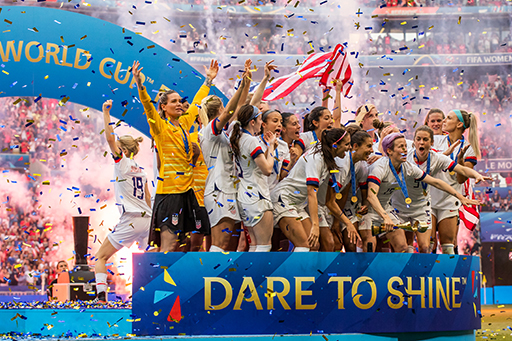4 What might make women’s football potentially more political than men’s?
It could be argued that women’s football is inherently more political than the men’s game for several reasons.
A personification of how politics imbues a women’s football team is evident in the modern US women’s national team, more commonly known as USWNT. Over recent years, there have been several instances of politics impacting the American national side to varying levels of controversy. In 2019, the USWNT won their fourth World Cup title (previous wins being in 1991, 1999 and 2015). However, the story of their 2019 tournament success often centred on politicalised rhetoric rather than their victory.
Activity 4 Politics and the USWNT
Watch the video from The Washington Post and then read the article by Drew Weisholtz. Identify two or more examples of how this case provides instances where politics was present in a manner we don’t tend to see as frequently within the men’s game.
How the US Women’s World Cup win became political [Tip: hold Ctrl and click a link to open it in a new tab. (Hide tip)]
Megan Rapinoe explains why she’s not participating in national anthem by Drew Weisholtz.
Discussion
Here are some comments on three examples.
- The USWNT class action lawsuit – wage discrimination is obviously far more pertinent to women’s football, given that males tend to earn significantly more from their salaries and endorsements. In 2014, the men’s national team received £5.19m for reaching the second-round of the World Cup in Brazil, compared to £1.29m that the women’s team received when winning the 2015 competition (Banymadhub, 2015).
- Rows with political leaders – given the USWNT’s position of speaking out over societal issues it is perhaps not surprising that captain Megan Rapinoe became embroiled in a row with divisive then US President, Donald Trump. During men’s World Cups we rarely witness players taking combative stances against political leaders of either their own nations or others. Though we did see members of the English men’s national team challenging government officials over the criticism they faced for taking the knee prior to fixtures at Euro 2020.
- National anthem protests – this one is not so clear cut as different between the men’s and women’s World Cups. This form of protest has been common in American sport since 2016, yet has occurred less frequently across the rest of the world. While many support players raising awareness of political issues, others feel protests during anthems disrespects national flags and patriotism. Similar themes occurred during the 2020 Tokyo Olympics (held in 2021 due to the COVID-19 pandemic) with one sportswriter claiming ‘When it comes to political and social demonstrations … 2021 is the year of women’ (Planas, 2021). Women’s football teams who knelt during Tokyo 2020 included USA, Sweden, Chile, Great Britain and New Zealand.
Within this section you have seen perhaps what makes women’s football more political than men’s. However, why might this difference exist? Reasons may include the decades of discrimination women have faced, and feminist culture which resists such discrimination. There is one more possible factor which there is not space to explore in this session. The sexuality of female players in some nations is far more open compared to male footballers i.e., they are able to openly express same-sex relationships while men do not yet. Gender related and other socio-political issues are arguably part of women’s experience which is perhaps why these are more visible in the women’s game.

